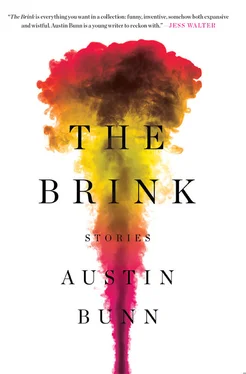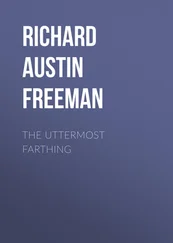How is it that some men inspire no feeling in me while others stir the deep waters? On those cathedral steps, I took his right hand, smooth as calfskin, and he pressed his left against the outside of mine, so that my hand was held in a gentle, warm prayer. I felt my blood rise up, the way a bulb of quicksilver feels in a pot of boiling water. He pointed to my ginger hair and made a flickering motion of fire with his fingers. I smiled like an idiot. And if Diego did not speak, his hands were more fluent than any words. He practiced a religion at the cook box, the communion of salt pork and sea fish, all that mattered. And at night, in shadows, those hands made other blessings. Now, at the bulwark, Diego looked eager and expectant. As if this encounter was his whole reason for coming.
The deck bell rang. Captain Veragua came to the entrance to his quarters. In the daylight, he was plainly dying. He wore a hood, white eyes shining from the shadow like marble. On our second week at sail, the captain had stupored on wine and a candle in his cabin tipped in a swell, setting his bedclothes and doublet alight. He jumped overboard and when he was fished from the water, his left side looked like a hank of meat rescued from embers. It took two days for Diego to pare the seared cloth from the captain’s skin with a carving knife. Every command he gave to us now was curt and purposeful, trimmed to the minimum amount of gesture.
“Peralonso,” the captain asked me, “what is that sound?”
My attention went to the sails. The wind had worn out; the main and the fore drooped without breeze. The ship’s planks creaked in complaint. The sea slapped lightly against the Elena . We had entered a white calm, the horizon crouched behind a mist. But as I listened, below all of this came a faint, wide roaring, like the rumor of a waterfall. It stretched the width of my perception.
“Land?” I answered.
The captain ordered the deep-sea lead hove overboard again. The lead, at one hundred fathoms, failed to find bottom. The brothers recalled the line, spliced a second to the first, and sent that into the sea. Again, the rope drifted behind in the current. The sea was too deep to sound.
Then the captain called for the crows to be released. They cawed up in their cage, high on the mast. Marco scampered up the rope ladder and released them. The birds circled higher and higher, hunting shoreline. As land birds, they hate travel over seawater. But they continued to circle until we could not make them out.
“ Listen,” the captain said.
Soon enough the drone was all I could hear. The Elena drifted in a weak current. Slowly, as the world reaches focus through a looking glass, the mist thinned and revealed itself as a great spume of ocean water. One league away, the curve of horizon straightened to a line, to a drop, like the edge of an enormous table. Clouds bent over this line and disappeared.
Coralito, the Elena ’s frail navigator, crossed himself and went to the captain, our sail chart spindled in his hand. He was an old and difficult man, a widower, too vain to admit his fading eyesight. Long white eyebrows billowed from his face, like puffs of sweet weather. But aged as he was, Coralito was the Elena ’s will, our human compass. At the Talavera Commission in Salamanca, he watched Queen Isabella decree, on a carpet of maps, that the world was a plate ringed by water and that to traverse this lip from Spain to the Indies would take three years. Under his breath Coralito had muttered, What do priests and Queens know of science? The world is not flat, but as round as a ball of wax and as knowable. You can leave a place, travel a line, and arrive where you began.
“What did you say?” the captain asked.
“I have failed you, Captain,” Coralito said. “I was wrong.”
The crows returned and settled noisily on two belaying pins.
“We have reached the edge of the ocean,” Coralito continued. “We can go no further. This is the fourth corner of the world.”
Every man is born to his first corner. Mine was a pile of flour sacks in a house in the port of Seville, in the year 1469, under the reign of King Ferdinand of Aragon. That year, my father, a blacksmith, was conscripted into the armada marvallosa in the English war and lost at sea. He returned to my mother as one thousand maravedis of wheat grain, the compensation for her sacrifice. Desperate and poor, my mother bricked in his furnace, hand-ground her grief into powder, and opened a bakery.
Every morning, I rose to find her kneading the dough, and I will always remember her ghosted with this fine white dust, cool and papery to the touch, haunting a passage to and from the oven. She was a striking, sad beauty, her hair gathered in a silver band. Countless men needled me in an effort to get her attention and force a smile on her. But none could tempt her out of the downward stare of her solitude.
“You must never leave me,” she would say, flattening my hand against her cheek. “One day you will want to. It will be a girl with gray eyes, or a distant shore. That day, you will count all the things that are keeping you here and they will not be enough. That day will be my last.”
My mother gave me the gift of letters. When I was thirteen years old, she led me to a field of goldenrod and covered my head in a shawl. She told me I must study a new book and make new prayers. I asked, “Who are we praying to?” and she said, “To the God of Israel, your true people.” That afternoon, I became two: a Catholic, the faith of my father, and a Marrano , Jew by candlelight.
Soon after, the butcher came on afternoons to sit me on his lap and write letters on a slate. He read the words aloud while I repeated them. Sometimes he would whisper made-up words in my ear, or put my hand on his belly to show me how breath worked until he sighed. I delighted in this, but my mother sent him away. “You’re too old for such things,” she said. I wept inconsolably for a loss I felt but couldn’t bring into words.
Over time, my mother’s bakery grew to serve the harbor, preparing tack and meal for sea journeys to and from the Levant, the terminus of the spice road. It was my task to deliver the breads to the barcas and navículas anchored in the river. I grew to love the crowded port, so dense with ships that I could hardly see the water. There were many familiar faces, salted in every crease, and crabs savoring the treacle on dry-docked hulls. The port felt like a floating city of fathers: exuberant, bronzed men, barefoot and dressed only in trousers. They taught me knots, the mysteries of splicing and parceling the cordage, even as they pilfered my breads. Many asked if I wanted to join their crews, but only if I could assure that their hardtack would never worm.
I was tempted. The sailors spoke of the Spice Islands, the Moluccas, and their incomprehensible bounty. They had seen the moon dyed orange by windblown curries, palms scorched betel-red. Along the coastline, the air was so heavy with pepper you had to breathe through cloth. It seemed to me that these spice villages harvested delirium, and the lives there were surely made of pure color.
Once, the boldest I ever was, I stole into the hold of a docked caravel. Twenty barrels sat lashed to the floor. One barrel had been knocked open, revealing a rubylike powder. Mace, the fine netting on the nutmeg shell. I’d seen it in the market, a spice so treasured that a tablespoon is worth a week’s labor. I tasted it with a finger. I felt that I was savoring a quality of dusk.
Just then, a mariner stepped from the shadows. He was broad-shouldered and grimy, as if he’d been swimming in the bilge. I stumbled back, afraid. He motioned for silence and slid closed the lid of the barrel. From the deck, I heard the mainsail catch in a gust and felt the ship pull.
Читать дальше











